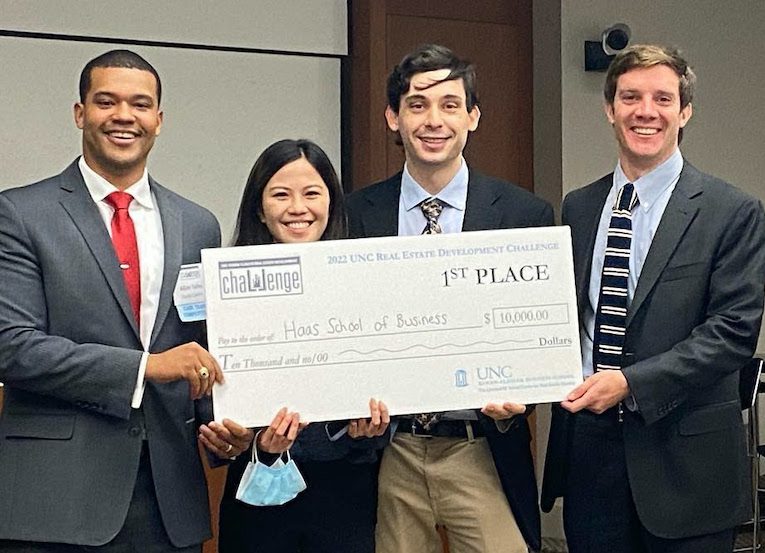
A team of Berkeley Haas MBA students won the 2022 University of North Carolina Kenan-Flagler Business School Real Estate Development Challenge for a plan to transform part of an historic Washington D.C. neighborhood.
“It’s great to bring this home for Haas and for Berkeley,” said Timothy Werby, MBA/JD 22, whose teammates included Vicky Li, Alijah Talley, and Santiago Recabarren, all MBA 23. Haas last won the competition in 2011.
The UNC Real Estate Development Challenge,hosted annually by the Leonard W. Wood Center for Real Estate Studies at Kenan-Flagler, convened 12 teams from the country’s top MBA programs on February 18.
This year, the teams had to plan, design, model financials, and create an investor presentation for development of a 9.25-acre site in Washington D.C.’s Anacostia neighborhood, south of the U.S. Capitol Building. To be successful, plans had to incorporate “the highest level of sustainability, embrace the surrounding neighborhoods, and deliver attractive risk-adjusted returns to investors.”
Focused on the community
Split across four presentation rooms, each team presented to a group of local real estate experts in 20-minute rounds, followed by five minutes of questions from the judges. Four finalists were then selected to present again in front of all of the judges, UNC students, and other competitors.
The Haas team’s presentation was designed thematically around the Nacotchtank, or Anacostans, an Algonquian-speaking, indigenous people who lived along the southeast side of the Anacostia River. Their design included a circular plaza to host pop-up farmer’s markets, an outdoor event space to be called the Frederick Douglass Pavilion, a new neighborhood grocery store, renovated school space, and a jazz stage that could be used for outdoor block parties and community events.
The team also pushed to include new multi-family housing and additional community spaces in future phases, including 43% more affordable housing units than was required.
“We all had our superpower”
Recabarren said the team excelled in part because it covered the project’s central issues comprehensively.
“We decided to pay more attention to the conceptual aspects of the project, which we defined as the four core values of our development: honoring local culture, health and wellness, sustainability, equity and inclusion,” he said.
The team had just four days to develop the whole project. “We were very fortunate to have Tim, who had a lot of experience in these competitions,” Recabarren said. “He convinced us on where and how we should use our resources.”
Talley said the team’s power was in its diversity, which enabled team members to tap into each of their strengths.
“Each of my teammates have different professional backgrounds, varied levels of real estate experience, and different lived experiences,” he said. “I think that we all had our own superpower and something tangible to bring to the table.”
Finally, Li said that the team was highly motivated to “do what it takes to take home the grand prize.
Vanderbilt’s Owen Graduate School of Management took second place while Rice University’s Business School and Dartmouth’s Tuck School of Business tied for third place.